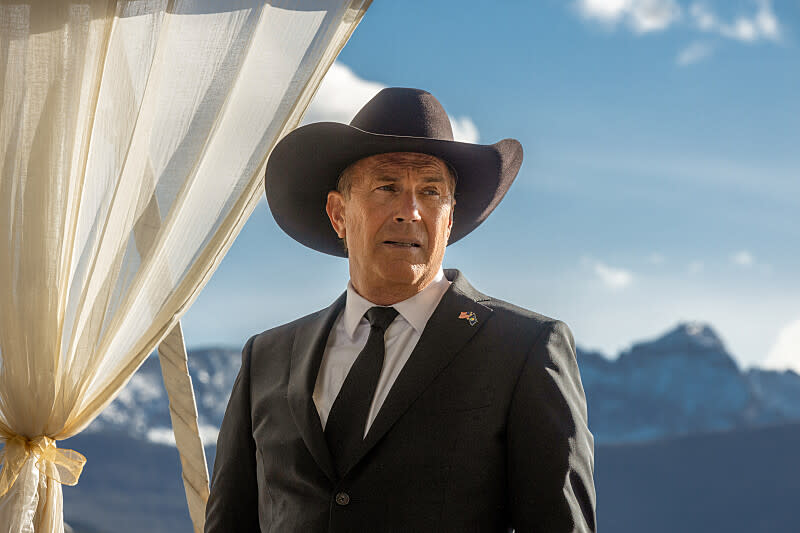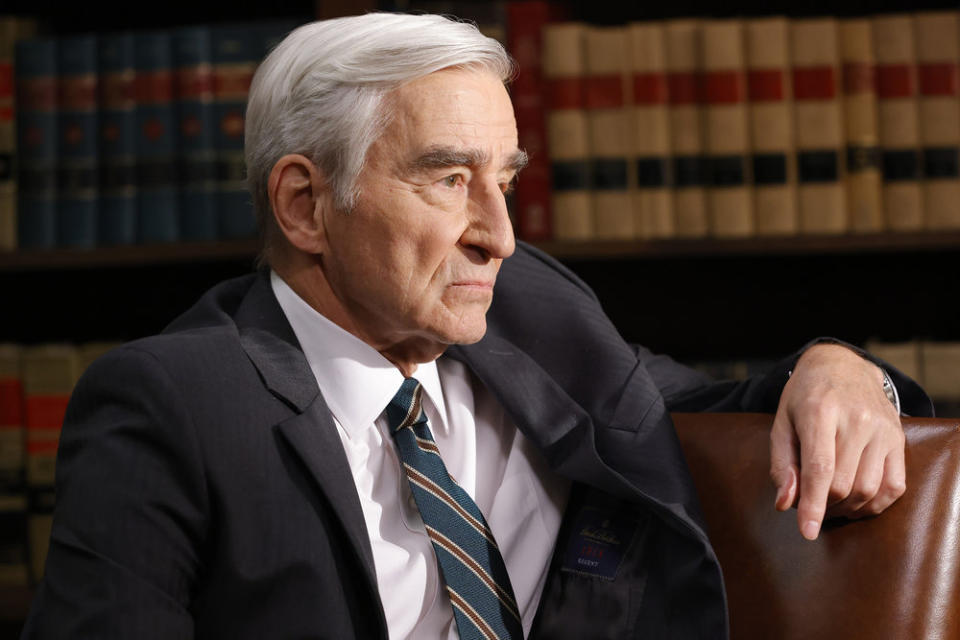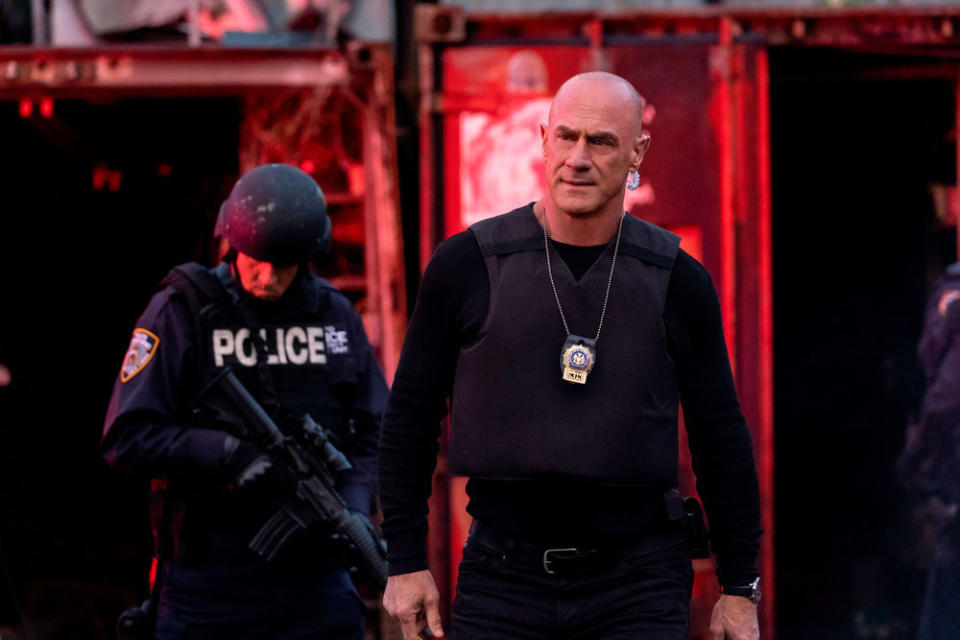Is ‘Yellowstone’ the Next ‘Law & Order’? A Hard Look at the Taylorverse and What It Means for TV

Remember when streaming was a boutique service? When Jenji Kohan’s productions were given a long, healthy life instead of fast-tracked for cancellation? Sure, there are still a number of specialty pluses — AMC+, Apple TV+, Shudder — but in accordance with corporate mandates, the name-brand streamers are expanding to court as wide an audience as possible. Netflix is pumping out reality TV, holiday movies, and plenty of true crime. Disney+ attracts the masses with worldwide brands like Marvel and Star Wars. Blockbusters have migrated from movie screens to SVOD, and even broadcast’s biggest hit (the NFL) is now a streaming success for Prime Video.
But, like a certain quarterback-starved football team learning what to do with a superstar under center, television remains in transition. Streaming takes priority (at the megacorps and in the media), even when some 70 million U.S. cable and satellite customers need to be served. Companies that are betting the future on OTT (as many still are, despite a tough year) must coax their most comfortable clients away from the habituated ease of set-top boxes and into the scary cloud of streaming. Media giants have to make what people are paying for now worth the money, while nudging them toward the alternative. They need them to pay for a subscription — or better yet, a subscription bundle — on top of their monthly cable or satellite fees. Just for now. Just for a little while. Maybe.
More from IndieWire
So far, the most reliable streaming lures are vast libraries and hit shows. But, as a wise child once said, why not both? Why not make hit shows that spawn into mini libraries all their own? Having all nine “Star Wars” movies is great for Disney+, but having 55 episodes in a galaxy far, far away, plus making-of specials and shorts, with new seasons every quarter? That’s better. And Paramount+ has been taking advantage of its own shooting “Star” since it was still CBS All Access, kick-starting the “Star Trek” franchise via new series like “Discovery,” “Picard,” “Strange New Worlds,” “Lower Decks,” and “Prodigy.” Yet in the Age of I.P., narratives needn’t travel to undiscovered planets to support a TV universe. Today, you can build a universe around one man, and if you’re Paramount, you’re betting one man can connect cord-cutters and satellite stans alike.
Enter the Taylorverse.
Orbiting “Yellowstone,” the most-watched series on television, Taylor Sheridan’s professed universe has quickly expanded to include nine series, four of which earned strong enough ratings to bait audiences for the remaining five. “Mayor of Kingstown” debuted in late 2021 as the top original scripted drama on Paramount+ (per the streamer). “1883,” a prequel to “Yellowstone,” pulled in 4.9 million viewers during its premiere on the Paramount Network (before its full run on streaming). And earlier this month, “Tulsa King” helped drive the most Paramount+ sign-ups in a single day (again, according to Paramount). By the end of 2022, the Taylorverse will comprise as many live-action programming hours as “Star Wars” on Disney+.
…except not all of Sheridan’s shows are available on Paramount+. While “Mayor of Kingstown,” “Tulsa King,” “1883,” and the upcoming “1923” (starring Harrison Ford and Helen Mirren) are exclusive to Paramount+, new episodes of “Yellowstone” only air on the Paramount Network, and old seasons only stream on Peacock (thanks to a much-maligned distribution deal made before Paramount Global regrouped around its OTT service). So while “Yellowstone” remains integral to Paramount’s future , its role at the moment is to a) prop up Paramount Network, and b) funnel viewers to the rest of the Taylorverse on Paramount+.
By now, you’re probably sick of reading the word “Taylorverse,” and let me tell you: I’m sick of writing it. Just like every young person isn’t a “millennial,” not everything tied together by a common thread has to be part of a universe — especially when half the titles are direct prequels to the original story. Sheridan’s shows aren’t like Marvel, where Nick Fury orchestrates team-ups, or Star Wars, where all the characters literally share the same universe (with a shared history). In “1923” (or “Yellowstone” Season 6), Harrison Ford and Kevin Costner aren’t going to go shooting together because their characters are separated by a century. (Ford reportedly plays Costner’s great, great grand-uncle.)
What Sheridan is doing isn’t building a universe; he’s building stacks. Before the Marvel Cinematic Universe made its final term trendy, TV already knew how to expand interconnected programs: There were crossovers, specials, and spinoffs, in addition to the ever-popular prequels and sequels. To help grow an audience, networks also used stacks: clusters of programs that feed off one another by sharing key similarities (like a creator) and being released in a manner that keeps viewers locked in to the same channel. Sometimes stacks were just one sitcom after the next — the 9 p.m. comedy feeding the 9:30 comedy — but they could also help grow a brand: like when “Grey’s Anatomy” preceded spinoffs “Private Practice” and “Station 19,” or when ABC paired up any of Shonda Rhimes’ shows.
And when it comes to building stacks, no one was better– check that, no one is better than Dick Wolf.

Will Hart / NBC
Today, Wolf’s franchising facilities are well-established. There’s “Law & Order,” which he grew from a pitch passed on by two networks into a tentpole supporting spinoffs “SVU,” “Criminal Intent,” “Trial by Jury,” “Los Angeles,” “True Crime,” and “Organized Crime” — including October’s three-hour crossover event that served as the Season 3 premiere for “Organized Crime,” Season 22 of the original series, and Season 24 of “SVU.” Since 2012, he’s also snowballed the “Chicago” franchise from “Chicago Fire” into “Chicago P.D.,” “Chicago Med,” and the one-and-done “Chicago Justice.” All together, NBC’s “One Chicago” shows are approaching 600 episodes. But that’s not all: Wolf also has the “FBI” franchise on CBS, including “FBI,” “FBI: Most Wanted,” and “FBI: International,” all of which are still airing new episodes.
Wolf was advocating for stacks long before the rest of the industry came around, but today both the “Chicago” and “FBI” shows air back-to-back-to-back on the same nights (Wednesdays and Tuesdays, respectively), while NBC airs “Law & Order” and “SVU” on Thursdays. That gives Wolf three nights of primetime across two networks with three distinct franchises.
“There are 56 actors under contract,” Wolf told Variety in May. “The concept is there are nine shows, and anybody who’s in any of the nine shows can appear in the other eight, even on different networks. It’s pretty cool.”
Producers, executives, and anyone invested in the business of Hollywood love stacks because they offer security in an insecure world. As much as anything can be guaranteed in entertainment, interconnected properties guarantee that the audience from the first show will have an interest in the second. Because they’ve already invested in one, they’re more likely to watch both — or all three.
When it comes to their stories, Wolf and Sheridan may not appear to share much DNA. “Law & Order” is a born-and-raised New Yorker, set and shot in the big city. “Yellowstone” doesn’t care for big cities (a feeling shared by its creator), preferring the big sky country inhabited by ranchers and America’s remaining cowboys. “Law & Order” is strictly business, a broadcast procedural handling a case every week without delving too far into the personal lives of its lead characters. “Yellowstone” loves its ongoing family fights, spats, and shootouts, with Kelly Reilly becoming a fan-favorite for her character’s extreme outbursts. It’s hard to imagine John Dutton and Jack McCoy having much to talk about.
But strategically and thematically, the two mega producers model a critical evolution in TV. For one, they’ve both founded insanely popular extended franchises. It’s hard to wrap your head around what 62 seasons across six “Law & Order” series even means when it comes to audience reach, but it gets even bigger when you factor in “Chicago” and “FBI.” While “Yellowstone” isn’t even a quarter of the way to the Mothership’s output, it’s posting viewership numbers many ratings experts thought were extinct. Wolf and Sheridan also dabble in reality TV, with “Cold Justice,” “Night Watch,” and “Criminal Confessions” still going strong and “The Last Cowboy” just starting its third season this month. (Bet you can’t tell whose shows are whose!)

Cara Howe / NBC
Then there’s the broadcast-to-streaming bridge each creator is building for their networks. Streaming may not care about timeslots, but “Yellowstone” is still teeing up Paramount Network “previews” of “1883” and “Tulsa King” and feeding Sheridan’s other shows. It’s stacking for streaming: “Yellowstone” fans from Paramount Network become “Tulsa King” viewers on Paramount+ — but Wolf is also pushing NBC audiences to Comcast’s molting Peacock. This year’s “Law & Order” crossover event helped boost streaming views for both the NBC flagship and Peacock’s online exclusive. Any year-to-year increase for a broadcast show is a win these days, but the bigger takeaway is that last season’s episodes were available on Hulu and Peacock, whereas this season’s are only on Peacock. Seeing “Law & Order” perform better on a much less successful streaming service is a minor coup — and exactly what Universal TV was hoping for when it signed Wolf to a rich overall deal in 2020.
Even that late in the game for “Law & Order,” there were no guarantees. It should go without saying that these shows aren’t easy to make. As much as snobby TV critics (like me!) can look down on formulaic procedurals or another “Sopranos”-style antihero drama, for any series to reach tens of millions of people, it has to speak to them. They have to be entertaining, but they also have to share a perspective that the audience appreciates — that they haven’t found elsewhere, that they want to investigate further, that they want to live with, week after week, year after year. That’s where Wolf and Sheridan’s stories connect.
“Law & Order,” “Chicago Fire,” “FBI” — these shows emphasize the status quo. Cops are here to help, courts are halls of justice, and the government, while flawed, tends to get things right. Wolf’s narratives thrived in an era where subscribing to such ideas was easy (for certain audiences), and they’re still embraced today because their format has become so commonplace, so comforting, that people would rather turn a blind eye to reality than see their television adjusted to reflect modern dispositions. Wolf set the standard 30 years ago, and we’re all still living with it now.
“Yellowstone,” “Mayor of Kingstown,” and “Tulsa King” recognize the status quo is under attack. Each of their leads sets out to preserve a tried-and-true way of life. John Dutton just wants to keep his family, his power, and his land; Mike McLusky (Jeremy Renner) doesn’t really know what he wants, other than to keep himself, his family, and his hometown afloat by any means necessary; Dwight Manfredi (Stallone), after 25 years in prison, feels mistreated by his mafia family, but it’s the only life he knows, so he tries to keep living it, even in Tulsa.
Sheridan’s shows are thriving today because nostalgia has been weaponized not only in popular culture, but politically, too. Some “Yellowstone” fans undoubtedly just like the drama or seeing Kevin Costner in a cowboy hat again. But others are sick of being told they have to change with the times. They identify with John’s reluctance to trust the next generation with his legacy. They’re suspicious of pivots and reappraisals, and they don’t like being told they’re wrong. With such resistance to new ideas comes a pessimism about the future. Take it from John himself:
“Working with them is a deal with the devil, Dad,” Jamie (Wes Bentley) says. “All the angels are gone, son,” John replies. “There’s only devils left.”
Living in the past seems to be a sound strategy for making movies and TV. Star Wars just keeps resurrecting its original characters. Marvel is making billions exploring the multiverse (and all its meta ties). But whether you call them universes or franchises, shows that span thousands of hours and run for decades at a time are the shows that you’re literally living with as you grow up and grow older. With “Law & Order” and “Yellowstone,” Wolf and Sheridan, shows that don’t change — and characters that make a point to resist change whenever possible — have proven a sound tactic to prevent real people from changing the channel. But those same people should remember: What you watch isn’t indicative of who you are, but before too long, it may be all you know.
Best of IndieWire
Sign up for Indiewire's Newsletter. For the latest news, follow us on Facebook, Twitter, and Instagram.
Solve the daily Crossword

